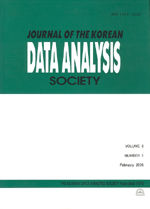남편의 지원이 기혼여성의 노동시장 참여에 미치는 영향
The effect of husband support on married women's participation in the labor market: Focusing on gender roles and housework
- 한국자료분석학회
- Journal of The Korean Data Analysis Society (JKDAS)
- Vol.24 No.3
-
2022.061047 - 1070 (24 pages)
-
DOI : 10.37727/jkdas.2022.24.3.1047
- 125

본 논문은 KLIPS 17차(2014년) 조사와 부가조사 데이터를 활용하여 남편의 지원이 기혼여성의 노동공급에 미치는 영향을 분석하였다. 남편의 지원 변수로 가사분담률과 3개의 가족 내 역할 인식 변수를 사용하였다. 취업 여부와 근로시간 모형을 사용하여 2가지 측면에서 기혼여성의 노동공급을 분석하였고, 이어 남편의 가사노동 분담률 결정요인을 살펴보았다. 분석 방법으로 기혼여성의 취업 여부에는 프로빗(probit) 추정을, 근로시간과 남편의 가사분담률 결정 모형에는 여성의 근로시간과 남성의 가사노동시간이 좌측 단절된(left-censored) 데이터라는 특성을 갖기 때문에 토빗(tobit) 추정법을 적용하였다. 추정 결과, 부부의 진보적 성 역할 인식과 남성의 가사노동분담이 기혼여성의 노동시장 참가에 긍정적 영향을 미치는 것으로 나타났다. 한편, 가사노동을 공평하게 분담해야 한다는 남성의 인식은 자신의 가사노동 분담률을 높였다. 저조한 상태에 머물고 있는 한국 여성의 노동시장 참가 증대를 위해서는 남성의 가족 내 역할 인식을 개선하고, 남성이 적극적으로 가사노동에 참여할 수 있게끔 제도적 장치를 마련하는 것이 필요해 보인다. 또한 주부 취업이 자녀에게 끼칠 부정적 우려를 잠식시키고, 여성이 노동시장에 참가할 수 있도록 국가 차원의 보육을 확대하는 것이 필요해 보인다.
This paper analyzed the effect of husband's support on the labor supply of married women by using data from the KLIPS 17th (2014) survey and additional survey. In the analysis of labor supply, the employment status and working hours model were used, and then the factors of husband's participation in housework sharing were examined. The probit estimation was applied to the employment status model, and the tobit estimation method was applied to the working hours and husband's household share rate model because women's working hours and men's housework hours had the characteristics of left-censored data. As a result of the estimation, it was found that the couple's perception of the progressive gender role and the sharing of domestic labor among men had a positive effect on married women's participation in the labor market. On the other hand, the stronger men's perception of the fair sharing of household labor, the higher the participation rate of household labor. In order to increase Korean women's participation in the labor market, it seems necessary to improve men's perception of gender roles and to allow men to participate in housework sharing. In addition, it seems necessary to expand national childcare so that women can participate in the labor market without worrying about their children.
1. 서론
2. 이론적 배경 및 선행연구
3. 자료 및 분석방법
4. 실증 분석 결과
5. 요약과 정책적 함의
Reference
(0)
(0)